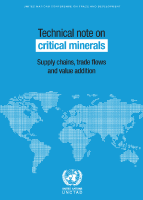
The move towards a low-carbon future is well underway and has brought to the fore the importance of several minerals judged critical to this process. These minerals include lithium, cobalt, graphite, manganese, and others essential to producing clean energy technologies, including solar panels, wind turbines, rechargeable batteries for electric vehicles (EVs), and grid battery storage. Developing countries hold large reserves of these minerals. African countries, for example, have about 25 per cent of global reserves, including 19 per cent of those needed for EVs.
Many developing countries are already playing a vital role in supplying world markets, such as the Democratic Republic of the Congo, from where 68 per cent of cobalt imports originate, Chile, a significant lithium exporter, and Indonesia, which accounts for 48 per cent of nickel exports. Since 2010, the typical quantity of minerals required for each new unit of power generation has risen by 50 per cent due to the growing proportion of renewables in total energy production. Demand for some critical minerals is expected to increase rapidly in a Net Zero Emissions scenario: by 115 per cent for cobalt and 454 per cent for lithium in the period from 2022 to 2030. With increased demand, the number of new critical minerals projects announced across 2021 and 2022 was more than twice the level of the previous decade.
The type and volume of critical minerals needed for the energy transition vary with specific applications and industries. For example, lithium, cobalt, and graphite are commonly used in lithium-ion batteries that are considered most suitable for EVs. Raw critical minerals are processed and refined to increase purity, enhance their performance characteristics, and increase suitability for specific applications. The processed and refined critical materials enjoy significantly higher values than those in their raw form and can stimulate the development of related downstream industries in the mineral-producing developing countries.
This technical note presents a snapshot of the trade dynamics of the critical minerals and critical-mineral-based products in different processing stages of rechargeable lithium-ion batteries for EVs. The note highlights specific characteristics of critical mineral markets, which indicate the areas for more in-depth analysis to support mineral-producing developing countries in increasing domestic value addition in rechargeable battery value chains.





